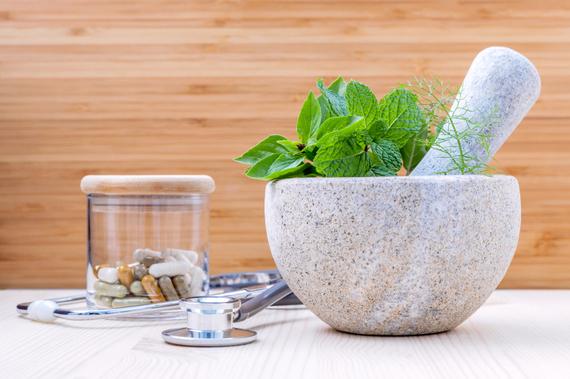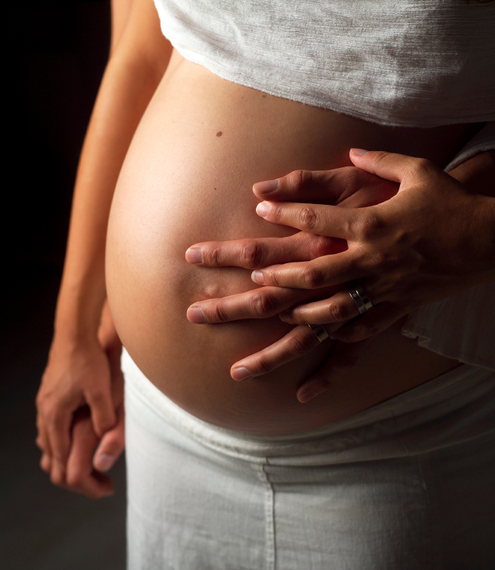Untreated antenatal depression poses serious risks for mom and baby both during and after pregnancy. In Parts 1 and 2 of this series I introduced and explored this topic via Jane, an amalgam of the countless women I've treated in my reproductive psychiatry practice. Treating mom is vital and it is never too late -- stopping the illness stops the pain and the consequent negative repercussions for mom and her baby. While each woman is unique, with specific needs and situations, there are common threads that bind treatment for antenatal depression and/or anxiety.
The gold standard treatment for antenatal depression is psychotherapy either with or without pharmacotherapy (medication), depending on specific symptoms. A typical treatment protocol for Jane (listed alphabetically below) combines these with adjunct and complementary therapies for improved healing.
Acupuncture
Acupuncture's myriad, research-proven benefits run the gamut, from the general, such as improving overall health and wellness, to the specific, like decreasing ankle swelling and nausea and other common pregnancy-related discomforts. Jane can even benefit from this complementary therapy's efficacy against antenatal and postpartum depression. Finding an acupuncturist who specializes in working with women around pregnancy is paramount and can be an asset to any treatment plan.
Eat!!!
It is amazing how much overlap there is between low blood sugar and anxiety/panic. Jane's treatment would involve an exploration of her diet to discover possible links between anxiety and periods of hypoglycemia, a condition often arising in depressed pregnant women due to a mood-induced lack of interest in eating.
Pregnant women especially should eat multiple small, protein-dense meals over the course of a day, not only to avoids dips in blood sugar, but also to minimize pregnancy-induced nausea by always keeping the stomach partially full.
Unless there is a clear, medically-indicated reason to follow a more strict diet, I primarily recommend a Mediterranean diet because it is healthy, enjoyable and nutrient dense. Women should eat as many vegetables and fruits as possible but keep them organic and GMO-free to minimize toxin exposure. Similarly, while fish is healthy, the large, fatty specimens at the top of the food chain should be avoided as they are high in mercury, a neurotoxin. The Environmental Working Group is a great resource for food safety in pregnancy and beyond.
Exercise
Going outside, getting fresh air and at least 30 minutes of exercise three to five days a week has benefits for mild to moderate depression during and after pregnancy. This may be a lofty initial suggestion for Jane, given how little energy she has and how minimal her recent activity has been. At first, I would encourage a walk around the block daily, building up gradually to more extended excursions, ideally with a friend for the added benefit of socialization.
Frankly, exercise is good for everyone, but it would be unfair and untrue to suggest that exercise alone will treat more severe forms of depression and anxiety. However, with medical clearance, exercise is a valuable addition to all treatment plans.
Folate, Not Folic Acid
Prenatal vitamins are necessary for a mother's health and that of her fetus and future baby as well. It is not uncommon for women to discontinue prenatal vitamins along with other forms of poor self care. Jane became less motivated and more disinterested in this and similar menial-seeming tasks as her mood episodes worsened.
Women should choose a prenatal with l-methyl-folate / active folate instead of folic acid, an inactive substance not produced or used directly in our bodies without first being converted to the active form.
Unlike folic acid, folate has been shown to reduce mild depressive symptoms, especially in women with a specific genetic polymorphism in the enzyme MTHFR (methylene tetrahydrofolate reductase) that converts dietary folic acid into the bioavailable active metabolite, L-methylfolate. Folate improves a variety of metabolic reactions including the production of neurotransmitters which can help to ease symptoms of depression and anxiety.
Although folate on its own will not treat moderate or severe depression/anxiety, a prenatal with folate will potentially elevate mood and increase antidepressant effectiveness.
Light Therapy
Morning bright light therapy has efficacy for treatment of antenatal depression, with up to 50% of pregnant, depressed women showing improvement in their symptoms. However, some women find it difficult to continue to use it consistently once the baby is born, and once stopped, the relapse rate is unfortunately high.
Pharmacotherapy (aka medications)
Antidepressants in the form of Selective Serotonin Reuptake Inhibitors or SSRIs are a primary mode of treatment, along with therapy, for depression and anxiety in pregnancy. Women like Jane with moderate to severe illness will benefit most from a dual approach of a medication along with psychotherapy.
More studies have been done on the use of SSRIs in pregnancy than any other class of medications except for prenatal vitamins. There is considerable controversy on this issue, but rather than review the pros and cons, I will instead refer to two of the many articles on the issue written by esteemed colleagues and ask you to consider the profound potential risks of untreated maternal mental illness as discussed in Parts 1 and 2 of this series.
Medication risks must always be weighed against the risk of leaving maternal illness untreated. Research has consistently found that in cases of moderate to severe depression/anxiety, the risk of treatment with SSRIs is less than the risk of failure to treat. However, treatment decisions should always be decided by a woman and her provider based on her symptoms, unique history and other variables like family history.
Jane's presentation is consistent with moderate bordering on severe depression and anxiety, and after a full discussion of the risks, benefits and alternatives, I would likely suggest starting an SSRI such as Sertraline to manage and improve her symptoms, along with psychotherapy.
Psychotherapy
Antidepressants are often partially effective on their own, but the combination of therapy and meds is most efficacious in the shortest period of time. Therapy benefits abound - one recent study found that moms whose antenatal depression improved after receiving CBT or other therapy during pregnancy had better sleeping babies with easier temperaments as compared to women whose depression did not improve during pregnancy.
Group therapy is also frequently very helpful by providing social and emotional support and guidance. The oft-felt profound isolation and shame associated with antenatal depression and/or anxiety is frequently diminished or resolved through this type of group work.
Along with recommending an antidepressant such as an SSRI, Jane would be strongly encouraged to start seeing a therapist on a weekly or twice weekly basis or even more frequently if indicated. Forming a strong alliance with a therapist is key, and working with them early and often will prove profoundly beneficial.
Sleep
Sleep is highly cathartic and profoundly important for mental health and wellness. Sleep deprivation is a sure-fire way to feel more anxious, sad and overwhelmed.
I would encourage Jane to prioritize her sleep now by improving her sleep hygiene and engaging in meditation daily. The American Academy of Sleep Medicine has published some helpful guidelines to maximize restful sleep.
Jane and her husband should plan shared night-duties for when the baby is born. Dad can and should help by getting up and either giving a bottle, or getting the baby ready for mom, and putting him or her down again after a feeding. Mom gains valuable extra sleep and Dad is granted an early opportunity to bond with baby.
Thyroid Health
Since abnormal thyroid function can present as anxiety or depression, and thyroid disorders are more prevalent during pregnancy than at any other time in woman's life, a thyroid panel is always included in the lab requisition that I give to women in Jane's situation.
Prenatal vitamins should include up to 1100 mcg of iodine per day to optimize thyroid health. Most OBGYN's will check thyroid function, but this can be requested if not already done.
Vitamin D
Low Vitamin D induces inflammation, which can cause a host of issues like antenatal and postpartum depression, preterm delivery and small babies, as explored in Part 1 and Part 2 of this series.
Jane, like many women who come to see me, has sub-optimal vitamin D levels. Returning them to normal range can improve mood significantly, so much so that one of my patients calls her vitamin D supplement "a daily dose of sunshine," and another her "happiness in a bottle."
Jane's pregnancy, poor prenatal vitamin compliance and limited sun exposure all negatively affect her vitamin D level, something unlikely to spontaneously improve over the course of a pregnancy without intervention. Supplementing with vitamin D would not be an effective treatment alone for Jane's depression, but will certainly help improve her mood in combination with the other recommendations in this article.
--------
Pregnant women who visit me exhibiting similar symptoms can expect to be offered a combination of therapy options similar to the above. Although not an exhaustive list, my goal is to explore a typical initial treatment plan for women experiencing antenatal depression and/or anxiety.
The first step out of depression and anxiety is asking for help. Speak to your partner, parents, siblings, friends or other loved ones. Reach out to your OBGYN or midwife. Let them know how you feel and that you need help, for you and your future baby's health and wellness.
Postpartum Support International (PSI) has many excellent resources available to support pregnant and new moms suffering emotionally.
Postpartum Progress has an extensive, valuable online support community as well as other options to help.
1800-LIFENET is available 24/7 or call 911 if you ever have thoughts of harming yourself or someone else.


